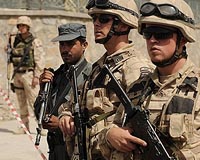| . |  |
. |
Baghdad (UPI) Sep 27, 2010 Iran's Revolutionary Guards have stormed into Iraq and killed 30 Kurdish insurgents in Tehran's latest display of military power that many see as a warning to Iraq's squabbling leadership about who calls the shots in their country as U.S. forces depart. The attack in the Qandil Mountains in northeastern Iraq followed recent Iranian artillery bombardments of the area held by fighters of the Party of Free Life in Kurdistan, or PJAK. Tehran said Sunday's attack was in reprisal for a bombing in the Iranian city of Mahabad Wednesday that killed 12 people and wounded 80. In June, Iranian troops were reported to have crossed into Iraqi Kurdistan and built a fortified base, one of several military incursions as Iraq struggles to form a government six months after stalemated elections. Tehran wants to ensure a pro-Iranian Shiite alliance takes power. Another area of contention is the disputed oil-rich Maysan border region in southeastern Iraq. The Iraqi government signed a 20-year production contract with a Chinese-Turkish consortium in May to develop a cluster of three oil fields there that contains 2.6 billion barrels of oil. Both Iran and Iraq claim it as their own. Revolutionary Guards occupied an oil well in the disputed Fakka field on the border for two weeks in December 2009, a move widely seen as a show of force along the poorly defined 800-mile frontier. It's even less defined further north in Kurdistan, where Iraq's Kurdish minority has a semi-autonomous enclave that it wants as a future independent Kurdish state. PJAK has bases there. Tehran has been making a concerted effort to promote an alliance of Iraqi Shiites, many of them supported by Iran, to form the next government following the inconclusive elections in March. With the U.S. military withdrawal scheduled for completion in late 2011, the Iranians want to ensure that postwar Iraq will be subservient to, if not directly controlled by, Tehran so pressure can be expected to increase. The Iranians aren't wild about Iraq's plans to quadruple its oil production over the next 6-7 years to 10 million-12 million barrels per day from the current 2.4 million bpd. If Baghdad succeeds in this, it would push prices down, which Iran cannot afford. This ambitious program -- many in the industry say it's too ambitious -- is heavily dependent on the 11 foreign consortia Baghdad has brought in to develop its long-battered oil industry over the last year. Two-thirds of Iraq's current reserves are in the south, which is dominated by the majority Shiites. Iran covets those fields and the Fakka incursion in December underlines its determination to prevent Iraq stealing what Iranians consider their oil. According to Hadi Nejad Hosseinian, a former Iranian deputy oil minister, Tehran has claimed ownership of 20 oil and gas fields along the border. Iran's actions have unmasked the centuries-old Persian ambition of dominating its historical Arab adversary. Above all, Tehran is determined that post-Saddam Hussein Iraq will never again be a threat on its western border. Iran's aim, it often seems, is to Lebanonize Iraq and its patchwork of sects and tribes, create networks of client militias, collaborators, agents and informers that would keep the country off balance and in turmoil, but able when it so desired to seize control by force if that became necessary. This is what has happened in Lebanon, where the Shiite Hezbollah is the most powerful military and political force in that sect-divided country. How Iran's strategy in Iraq will play out now depends to a large extent on who heads the next government: the incumbent, Nouri al-Maliki, who will become even more pro-Tehran if he succeeds, or former premier Iyad Allawi, once a CIA asset, who wants as little as possible to do with Iran. "Iraq could well become an Iranian satellite," George Friedman, founder and chief executive officer of the Texas global security consultancy Stratfor, wrote in a recent essay. "While Iran may not be able to impose a pro-Iranian state on Iraq, it has sufficient influence to block the creation of any strong Iraqi government either through direct influence in the government or by creating destabilizing violence in Iraq. "In other words, Iran can prevent Iraq from emerging as a counterweight to Iran, and Iran has every reason to do this. Indeed, it is doing just this."
Share This Article With Planet Earth
Related Links News From Across The Stans
 NATO, Afghan forces sweep through Kandahar
NATO, Afghan forces sweep through KandaharKandahar, Afghanistan (AFP) Sept 27, 2010 Hundreds of Afghan police on Monday joined a key military offensive against the Taliban in their heartland in southern Afghanistan, officials said. NATO forces are leading a new push against insurgents in Kandahar city and surrounding areas, dubbed Operation Dragon Strike, officials said. Dragon Strike was the latest phase of Operation Hamkari, seen as a last-ditch effort to eliminate th ... read more |
|
| The content herein, unless otherwise known to be public domain, are Copyright 1995-2010 - SpaceDaily. AFP and UPI Wire Stories are copyright Agence France-Presse and United Press International. ESA Portal Reports are copyright European Space Agency. All NASA sourced material is public domain. Additional copyrights may apply in whole or part to other bona fide parties. Advertising does not imply endorsement,agreement or approval of any opinions, statements or information provided by SpaceDaily on any Web page published or hosted by SpaceDaily. Privacy Statement |